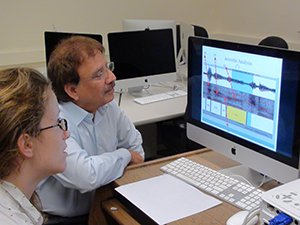
Tej Bhatia is not exactly the cloak-and-dagger type, but, if pressed to explain himself, the affable, slightly built professor, with a mop of brown hair and thick mustache, is proof that appearances are deceiving.
Which is probably a good thing, considering his line of work.
A linguistics professor in Syracuse University’s Department of Languages, Literatures, and Linguistics (LLL), Bhatia has held a myriad of positions on campus. In the College of Arts and Sciences, he oversees the South Asian Languages Program and has directed both the linguistic studies and cognitive science programs.
But it’s Bhatia’s up-to-the-minute work as a fellow in the college’s Forensic and National Security Sciences Institute (FNSSI), where he conducts research and mentors graduate students, that has brought him recent acclaim.
“Tej’s work is certainly groundbreaking and brings together several key disciplines, including psychology, linguistics and pattern recognition,” says James T. Spencer, Meredith Professor of Chemistry and executive director of FNSSI. “He’s setting high standards of excellence that are opening up new multidisciplinary dimensions of the field.”
To be sure, Bhatia’s work in FNSSI marks the culmination of years of study in practically all branches of linguistics. This has led to his publication of 16 books and dozens of articles and book chapters, many of which focus on South Asian linguistics. Last year, the American Library Association named “The Handbook of Bilingualism and Multilingualism” (Wiley-Blackwell, 2012), which Bhatia co-edited with LLL professor William C. Ritchie, a “CHOICE Outstanding Academic Title.”
Read the full article at SU News.
